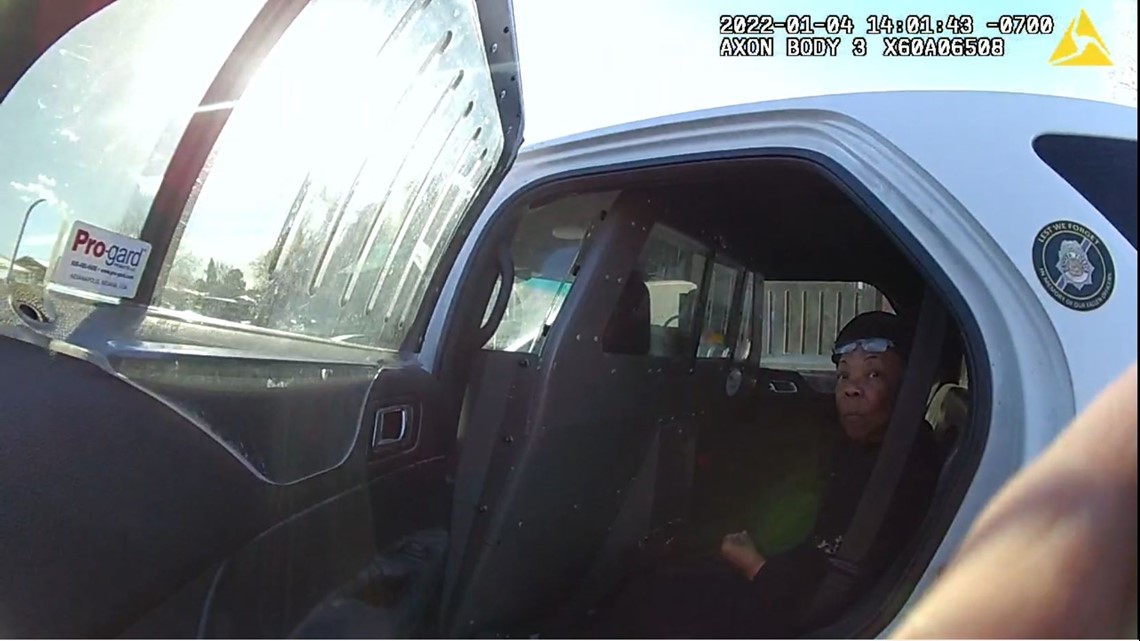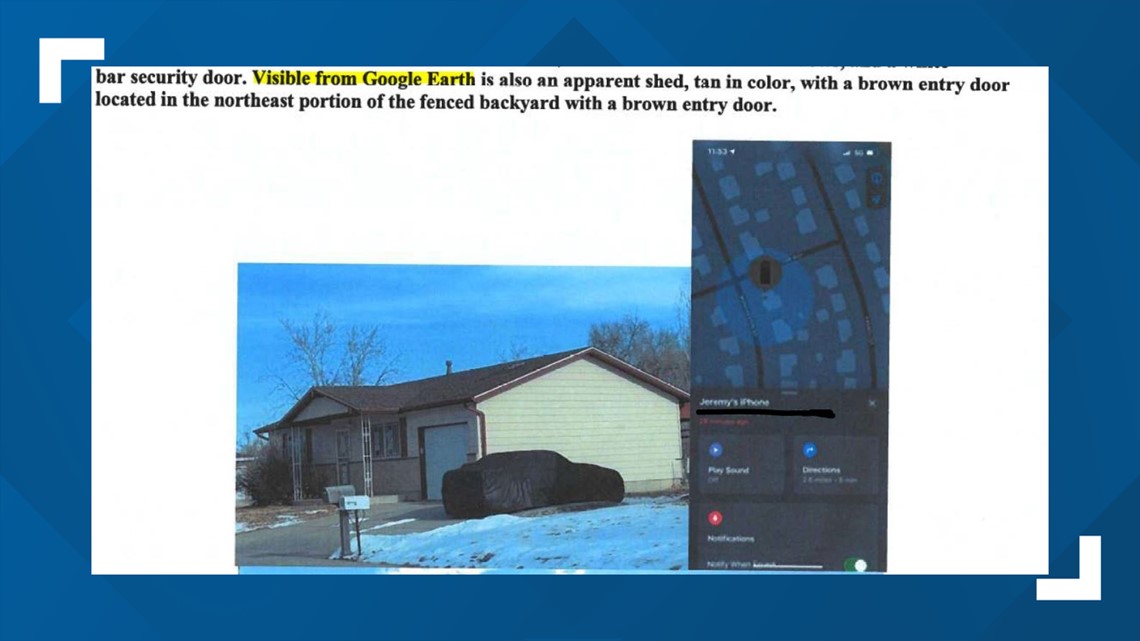DENVER — The American Civil Liberties Union Foundation of Colorado (ACLU) sued a Denver Police Department (DPD) detective Thursday morning for a SWAT warrant the ACLU claims was a violation of a Montbello woman’s constitutional rights.
The police department's SWAT team searched Ruby Johnson’s home, where she has lived for 40 years, looking for a car, guns and cash that had been stolen from a downtown Denver hotel days earlier.
The lawsuit names DPD Detective Gary Staab, in his official capacity as an officer, as a defendant.
Mark Silverstein, ACLU legal director, said Staab's “bare bones” warrant should have never “sailed through” the system so easily.
“This is a case of a detective who didn’t do proper investigation, did not have adequate facts, he should not have asked for a search warrant,” Silverstein said.
“His supervisor should never have approved it. The district attorney should not have green-lighted it. And the judge should not have issued it.”
DPD Spokesperson Jay Casillas wrote in an email that the Department of Public Safety and Denver Police “sincerely apologize” for any “negative impacts” the search may have had.
“Once Denver Police Chief Ron Thomas was made aware of concerns expressed by Ms. Johnson’s family regarding the warrant, the Department reached out to the family,” Casillas wrote. “We hope to continue to work with Ms. Johnson’s family through her attorneys to resolve this matter without further litigation.”
Casillas wrote that Chief Ron Thomas ordered an internal investigation into the warrant executed at Johnson’s home. Thomas is working with the Denver District Attorney’s office to create training for officers and members of the district attorney's office to improve the process for seeking warrants based on phone applications.
A spokesperson for the Denver District Attorney said in a statement that they signed off on it because they believed there was enough for the search based on the facts provided by DPD.
“...Our office is obligated to review every search warrant the Denver Police Department writes to ensure it is legally sufficient based on the facts to which the detective swears,” Carolyn Tyler, Denver DA spokesperson, wrote in an email. “If there is probable cause to believe stolen property was at a location, we will authorize the search warrant per CRS § 16-3-301.”
Kristin Wood, spokesperson for Judge Beth Faragher and Denver County Court, would not go into specifics related to the case but wrote that the probable cause required for a warrant does not "require a very high probability."
“As in every search warrant signed by a judge, the officer was sworn in by the judge and the officer swears under penalty of perjury that the statements contained within their affidavit are true and correct to the best of their knowledge,” Wood wrote. “If probable cause is found, the search warrant is issued.”
Body camera video obtained by 9NEWS shows 77-year-old Ruby Johnson appearing confused and weary, approaching officers outside in a black robe and bonnet with her glasses on her forehead. She looks around, uncertain about what's going to happen.
“I didn’t want them coming in there shooting,” Johnson said. “I came out, and then they asked me, ‘Do you have a gun on you?’ I said, ‘No, why would I have a gun on me?’”
As officers searched her home, Johnson was waiting in the back of a nearby police car. She said the experience was traumatizing and led her to feel unsafe in the home she has lived in for about 40 years.
“When I start thinking about it, tears start coming down,” she said.
The lawsuit came in response to a months-long 9NEWS investigation that documented Johnson’s ongoing trauma related to the warrant. Most of the complaint focuses on how police did not find anything at Johnson’s home.
“Officers combed through Ms. Johnson’s home for hours and found no evidence of anything even remotely connected to any criminal activity,” Paul Karlsgodt, an attorney working with the ACLU on the lawsuit, wrote in the complaint. “The illegal search succeeded only in leaving the innocent Ms. Johnson traumatized.”
Karlsgodt wrote in the lawsuit that the warrant caused “irreparable harm” including property damage and long-lasting trauma. The lawsuit doesn’t name a total amount of money they are seeking from the DPD detective. Silverstein said it will be up to a jury to decide exactly how much Johnson deserves.
Gwendolyn Brunson, Johnson’s daughter, said she called the detective who created the warrant to seek answers.
“I said, ‘I need to find out what’s going on and who assaulted my mom',” Brunson said. “And I said assaulted, but I did not mean physically assaulted but assaulted her mentally, emotionally because she was so upset.”


Johnson is a single mother who raised her kids in the area. She said she no longer wants her children or grandchildren to visit her because she fears the police could come back and hurt them.
Rita Whittington first befriended Johnson more than 20 years ago in church. She said she has noticed her friend has changed since the warrant, with a new “sadness” she has not seen before.
“It’s still hurting us. It’s still affecting her,” Whittington said. “Until we see her whole again, I want to see her better than she was. I want to see her whole again, smiling again, at peace again, that feeling of violation – I want her healed of that.”
Joe Montoya, division chief of investigations with DPD, said in an October 2022 interview that the department did not intend to harm Johnson and regrets that the warrant caused suffering.
“We can always apologize, and I’d be willing to apologize that there was a warrant issued and evidence was not found there,” Montoya said. “That’s a given, but I don’t think there was anything done to intentionally traumatize her.”
The ACLU is particularly concerned that the search warrant hinged entirely on electronic surveillance and no on-the-ground police work to verify any claims that the stolen goods would be at Johnson’s home.


“The warrant authorizing the illegal search of Ms. Johnson’s home issued on Defendant Staab’s hastily prepared, bare-bones, misleading affidavit,” Karlsgodt wrote.
Johnson’s home was targeted because of a Find My iPhone ping. An old iPhone was in the stolen truck, which the owner was tracking. Karlsgodt wrote in the complaint that Find My iPhone ping accuracy depends on how clear of a view the phone has to satellites. The larger the blue circle around the device, the more possible locations that the device could be in. In this instance, there were multiple properties within that circle, not just at Johnson’s home. That was not mentioned in the warrant.
“Defendant Staab presented his false characterization of the screenshot’s meaning as an objective fact and omitted the particular facts and circumstances that contradicted it. These omissions and his mischaracterization prevented the reviewing judge from independently evaluating the existence of probable cause.”
Silverstein said there was an appalling lack of police work in the days leading up to the warrant’s execution.
“This warrant should have never been issued,” Silverstein said, “It should never have been approved. The SWAT team should have stayed home and the detective should have maybe done some more investigation.”
> The lawsuit is below:
Full statement from Jay Casillas, spokesperson for the Denver Police Department:
“The Department of Public Safety and Denver Police Department (DPD) sincerely apologize to Ms. Johnson for any negative impacts this situation may have had on her. SWAT was involved in the execution of the warrant due to allegations that six guns had been stolen and may have been located in Ms. Johnson’s home. Once Denver Police Chief Ron Thomas was made aware of concerns expressed by Ms. Johnson’s family regarding the warrant, the Department reached out to the family. We hope to continue to work with Ms. Johnson’s family through her attorneys to resolve this matter without further litigation.
Chief Thomas has also ordered that an internal investigation be opened and DPD is working with the Denver District Attorney’s office to develop additional training for officers and assistant district attorneys related to seeking warrants based upon find my phone applications.”
Full statement from Carolyn Tyler, spokesperson for Denver District Attorney’s office:
Carolyn Tyler: “Per our email exchange on October 28th, our office is obligated to review every search warrant the Denver Police Department writes to ensure it is legally sufficient based on the facts to which the detective swears. If there is probable cause to believe stolen property was at a location, we will authorize the search warrant per CRS § 16-3-301. I have nothing further to add.”
Full statement from Kristin Wood, spokesperson at Denver County Court:
“Thank you for your emails. Judge Faragher cannot provide opinions or perspectives; it would be contrary judicial code of conduct.
We can certainly comment on process. As in every search warrant signed by a judge, the officer was sworn in by the judge and the officer swears under penalty of perjury that the statements contained within their affidavit are true and correct to the best of their knowledge. If probable cause is found, the search warrant is issued. Probable cause does not require a very high probability, despite the use of the word ‘probable.’
SUGGESTED VIDEOS: Investigations & Crime


